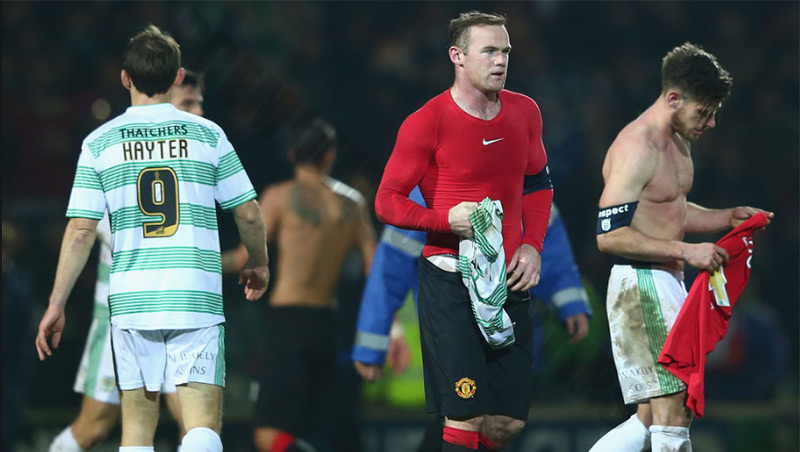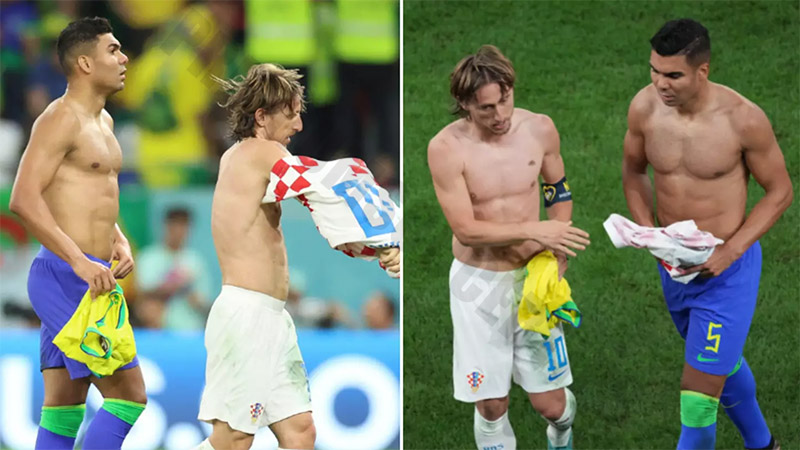The meaning behind football players swapping shirts
Football, known as the “king of sports”, is not only a game but also a symbol of noble values in sports. One of the special and meaningful cultural features of this sport is the tradition of football players swapping shirts, which takes place regularly and always attracts the attention of fans. So why do players perform this action? Join Premiumsoccertips.net to learn about the meaning and reason behind this tradition through the article below!

Why do soccer players swap shirts?
The tradition of players exchanging shirts was first recorded in 1931, during a match between France and England. The relationship between these two countries is not only limited to football but also has a strong historical mark. At that time, the French team was considered weaker, but caused a big surprise when they won. The joy of victory made the French players want to keep a special memory, and they asked the English players to exchange shirts. The English team accepted, and from then on, the tradition of exchanging shirts was formed and became an indispensable part of football.
The meaning of shirt swapping between players
Swapping shirts in football has a deep meaning, being part of a respectful tradition. A shirt is not just a simple playing outfit but also a personal symbol of each player, with the name, shirt number and team badge attached. Therefore, when two players swap shirts, it is a way to show respect and acknowledge the talent of the opponent.

This also explains why players often choose to swap shirts with opponents they consider worthy or admire. However, sometimes this action can also take place at the request of a player, regardless of the reputation or class of the opponent.
Are players required to swap shirts?
Not at all! It is not mandatory. Players do not usually consider it a special event, but sometimes it is a memorable moment, especially for young players, when they get to play with their idols. A memorable example is the story of young centre-back Jon Ashton in the early 2000s.
Former Leicester City player Paul McAndrew told The Athletic: “We played Manchester United when Micky Adams was manager. It was the day we were relegated from the Premier League. Laurent Blanc, the France captain, was playing for Manchester United at the time, and John Ashton was a young player for us.
After the game, John asked Blanc for his shirt. Laurent, who was a very friendly guy, took off his shirt and gave it to him. John thanked him and took the shirt, but Blanc looked at him as if to say, ‘Where’s your shirt?’. John sheepishly asked, ‘You want mine?’. Laurent laughed and said, ‘Of course!’
I like to think that somewhere, in Laurent Blanc’s house, John Ashton’s shirt is still hanging as a souvenir”.
Players are just like fans
It’s no surprise that football players are some of the sport’s most passionate fans. Many players have grown up watching great football stars and yearning to have their idol’s shirt. This also reflects part of the tradition of swapping shirts – when players ask for shirts from those they admire.

Asking for and exchanging shirts actually has a deeper meaning than we think. When a player asks for a shirt from a colleague, it is often a clear sign of respect for that person’s talent and influence. Lionel Messi, one of the legends of football, rarely takes the initiative to ask for a shirt. However, he once broke the rule and asked for Zinedine Zidane’s shirt.
A typical example is young midfielder Eduardo Camavinga. As a big fan of Cristiano Ronaldo since childhood, Camavinga did not miss the opportunity to ask for CR7’s shirt. After receiving the shirt, he shared a photo on Snapchat with the caption: “I won’t be washing it”.
How do players use these jerseys?
As mentioned, football players are not only participants in the game but also passionate fans of the sport, often collecting jerseys from different matches. For most players, these jerseys are not only souvenirs of a match but also symbols of the stars they have exchanged shirts with. This is also a way for them to remember the milestones in their own careers. Some players consider collecting jerseys a passion and do not hesitate to share their collections.

Sometimes, there are arguments when two players want to own each other’s jerseys. Although the shirt exchange usually takes place after the match, there are also times when the exchange takes place during the match. This tradition is a great testament to the spirit of sportsmanship, and hopefully will always be an indispensable part of football, spreading to other sports.
Ronaldo and Messi have never swapped shirts!
So the question is: if swapping shirts is a way to show respect and players often choose to swap shirts with opponents of similar skill level, why don’t Messi and Ronaldo do it? They clearly have mutual respect for each other and have met many times on the pitch, so why don’t they swap shirts? Is it because of the rivalry between the two?
Despite what fans and commentators may think, the truth is not like that. Neither Messi nor Ronaldo has ever proactively asked for shirts from any other player. They are so used to other players asking for their shirts. On the other hand, whenever Messi and Ronaldo face each other, it is quite normal for players from the opposing team to ask for shirts before the match.
So have we ever seen these two legends swap shirts? The answer is yes.
Conclusion
The tradition of exchanging shirts in football is an integral part of the game, symbolizing respect, solidarity and a way to capture memorable moments in each match. Originating in 1931 during a match between France and England, the practice has become a symbol of admiration and sportsmanship. Although not compulsory, many players consider the practice of exchanging shirts as a gesture of respect towards their idols or teammates. These shirts become precious mementos, marking milestones in a player’s career. Widely recognized around the world, this tradition remains an important part of the “beautiful game”, reflecting the core values of football both on and off the pitch.
See more: How many times has Real madrid won the Champions league?








